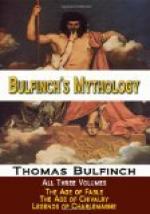However, he stretched out his neck as ordered, and the stranger raised his axe till it crashed upwards through the rafters of the hall, like the crash of trees falling in a storm. When the axe came down with a terrific sound all men looked fearfully at Cuchulain. The descending axe had not even touched him; it had come down with the blunt side on the ground, and the youth knelt there unharmed. Smiling at him, and leaning on his axe, stood no terrible and hideous stranger, but Curoi of Kerry, come to give his decision at last.
“Rise up, Cuchulain,” said Curoi. “There is none among all the heroes of Ulster to equal you in courage and loyalty and truth. The Championship of the Heroes of Ireland is yours from this day forth, and the Champion’s Portion at all feasts; and to your wife I adjudge the first place among all the women of Ulster. Woe to him who dares to dispute this decision!” Thereupon Curoi vanished, and the warriors gathered around Cuchulain, and all with one voice acclaimed him the Champion of the Heroes of all Ireland—a title which has clung to him until this day.
This is one of many stories told of the Irish champion, whose deeds of bravery would fill many pages. Cuchulain finally came to his end on the field of battle, after a fight in which he displayed all his usual gallantry but in which unfair means were used to overcome him.
For Wales and for England during centuries Arthur has been the representative “very gentle perfect knight.” In a similar way, in England’s sister isle, Cuchulain stands ever for the highest ideals of the Irish Gaels.
HEREWARD THE WAKE
In Hereward the Wake (or “Watchful”) is found one of those heroes whose date can be ascertained with a fair amount of exactness and yet in whose story occur mythological elements which seem to belong to all ages. The folklore of primitive races is a great storehouse whence a people can choose tales and heroic deeds to glorify its own national hero, careless that the same tales and deeds have done duty for other peoples and other heroes. Hence it happens that Hereward the Saxon, a patriot hero as real and actual as Nelson or George Washington, whose deeds were recorded in prose and verse within forty years of his death, was even then surrounded by a cloud of romance and mystery, which hid in vagueness his family, his marriage, and even his death.
Briefly it may be stated that Hereward was a native of Lincolnshire, and was in his prime about 1070. In that year he joined a party of Danes who appeared in England, attacked Peterborough and sacked the abbey there, and afterward took refuge in the Isle of Ely. Here he was besieged by William the Conqueror, and was finally forced to yield to the Norman. He thus came to stand for the defeated Saxon race, and his name has been passed down as that of the darling hero of the Saxons. For his splendid defence




